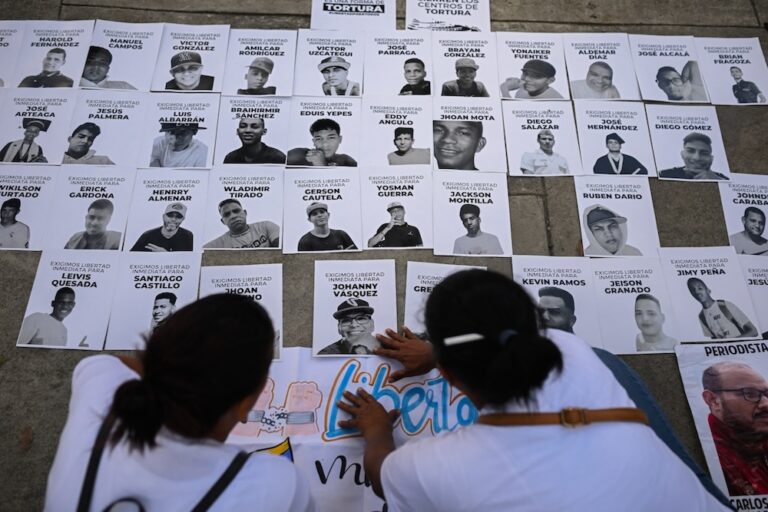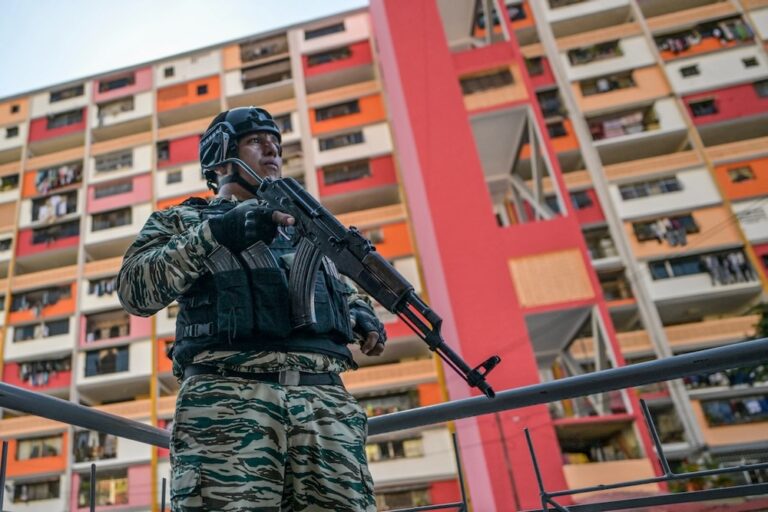Since March 15, 2013, Rayma Suprani, cartoonist; Leonardo Padrón, writer; Laureano Márquez, comedian; Mariela Celis, radio and TV show host and the journalists Ibeyise Pachecho, Francisco (Kiko) Bautista, Nitu Pérez Osuna, Mary Montes, Milagros Socorro, Berenice Gómez, Alberto Federico Ravell among other public personalities have been subjected to death threats, insults, disqualification of their work […]
Since March 15, 2013, Rayma Suprani, cartoonist; Leonardo Padrón, writer; Laureano Márquez, comedian; Mariela Celis, radio and TV show host and the journalists Ibeyise Pachecho, Francisco (Kiko) Bautista, Nitu Pérez Osuna, Mary Montes, Milagros Socorro, Berenice Gómez, Alberto Federico Ravell among other public personalities have been subjected to death threats, insults, disqualification of their work and pressurs to cease their criticism of the current state of the nation. The persons responsible for these actions are anonymous, as they are using phone calls, text messages and Twitter to issue the threats.
As reported, the victims have identified the phone numbers from which they received the threatening calls. They have also determined that the intimadating tweets allegedly come from the accounts @revoHCF; @cainsupr3m0; @NTreintayTres; @Mipatriasocial;@joseangelpinto, among other accounts.
Supposedly, @revoHCF had broadcast the personal phone numbers of some public personalities who have maintained critical opinions regarding the current government’s actions. The persons affected also stated that their phone contacts had apparently been circulated through a text chain message.
Rayma Suprani
Rayma Suprani informed IPYS-Venezuela and IFEX, in writing, that since March 18, 2013 she has received a series of verbal aggressions and intimidating messages through personal communications. “My cell phone started to receive an avalanche of text messages from several numbers, the messages contained personal insults and terrible threats against me, rude comments and slander of a political nature and demonisation of my work as an opinion writer and illustrator”. Suprani works for El Universal, a private newspaper of nationwide circulation that maintains an independent editorial line.
Leonardo Padrón
Leonardo Padrón sent a written complaint to IPYS-Venezuela explaining that at the same day and time he had also been a victim of threats and disqualifications. “I started receiving calls and text messages (SMS) of an insulting tone and content. Messages that offended my personal integrity, urging me to shut up and to not give my opinion on the government’s actions, telling me to leave the country or go into hiding, etc. The calls were made not only to my cell phone, but also to my home phone. Later, I realized that my phone numbers had been published on Twitter, encouraging the followers of the government to call me and insult me. The harassment also took place on Twitter. It was 11 p.m. and these calls continued so persistently that I had to unplug my home phone and turn off my cell phone”.
Padrón mentioned that the attacks continued for several days. He added that some messages said: “Dirty, trash. You should leave the country because you are not welcome here, son of a b…!”; “Have you told your family what a slut you are?”; “Now you are going to wish that Chávez had not died”; “…You are very macho hidden behind that damn phone. Come to the slum called La Bombilla (a part of Petare, Caracas); “Chavez lives, the fight continues!”; “You are worse than dirty Carlos Andrés Pérez (a former president of the republic of Venezuela)! People-seller! Savage!”.
Laureano Márquez
Laureano Márquez, a Venezuelan comedian, commented during an interview offered in César Miguel Rondón’s radio show on 99.9 FM in Caracas that he has received a series of insults and aggressions after he wrote an editorial entitled “Humor according to Aquiles”, published in the daily Tal Cual, a private newspaper in Caracas, on March 15, 2013. This coincided with the funeral of President Hugo Chávez.
Márquez explained that in his article he referred to some visions of the humor of Aquiles Nazoa, a recognized Venezuela writer who passed away some years ago. He added that in this editorial he made no remarks to the current watershed in Venezuela, but he received claims from some of Nazoa’s family members, who alleged that the comedian used some tenets of the Venezuelan writer to tarnish the memory of Hugo Chávez. These concerns were allegedly voiced by the family in a letter read out loud by Mario Silva, host of the opinion program “La Hojilla”, aired on a state-owned TV channel Venezolana de Televisión (VTV).
Milagros Socorro
Milagros Socorro said via her Twitter profile @MilagrosSocorro that she received death threats after having offered an interview on March 15 on “Aló Ciudadano”, a program on Globovisión, a private TV station that has maintained a critical line against the official government. In her account, the journalist stated “I have received this: `@pepedorro: in a dictatorship you would have a shot to the head right now. Learn to respect and shut your mouth”.
Socorro tols IPYS-Venezuela that the threats have persisted, and she has received phone calls and text messages to her personal cell phone that slander her, verbally assault her and threaten her. On March 19, the journalist posted on Twitter: “Ernesto Villegas, I make you responsible for the harassment I have been subjected to since Friday, which reinforces my democratic conviction”.
Journalists
Ibeyise Pacheco informed IPYS-Venezuela that she received death threats through phone messages. IPYS-Venezuela also corroborated through Twitter that other journalists have been threatened, including Mari Montes, Mariela Celis, Francisco (Kiko) Bautista, Nitu Pérez Osuna and Berenice Gómez.
Montes, through his Twitter account @porlagoma wrote: “I am receiving very poorly written, vulgar and hate-filled SMS. The real pain in the neck is that my battery is exhausted faster”. In turn, Mariela Celis, in her profile @Lacelis, denounced: “I am receiving death threat(s) and sms messages insulting me”.
Freedom of expression
These threats and aggressions represent a violation of freedom of expression and information. They also put the life and integrity of the journalists, comedians, cartoonists and other public personalities who express their opinions and criticisms in the public arena, at risk. Likewise, they breach the honor, reputation, and the right to privacy of the persons affected.
Article 60 of the constitution of the Bolivarian republic of Venezuela sets forth that “Every person has a right to protect their honor, privacy, their image, confidentiality and reputation. The law shall limit the use of information technology to guarantee the personal and family honor and privacy of ctizens and the full exercise of their rights”.
Filing complaints
It is expected that in the coming days some of the affected parties shall file complaints with the corresponding Venezuelan public institutions. The first complaint filed on account of these cases was done on March 22, 2013, when Rayma Suprani went to the office of the Attorney General of the Republic to make a formal complaint about the threats she received. She demanded justice for the attacks levied against her, and expressed that she expects the state to conduct an investigation and that the case not remain unpunished. She said that she has filed two complaints at the attorney general’s office and so far nothing has happened.
On March 14, 2012, the cartoonist of El Universal denounced that she had received threats and insults in her Twitter account and through email. Also, on January 24, 2011, Suprani received threats through Twitter, from the account owned by (the deceased) Lina Ron who at the time was the leader of the political party Unidad Popular Venezolana (UPV) and a political activist for Hugo Chávez. The threats started due to the content of a vignette by Suprani published that day in El Universal.
Data
In 2012, IPYS-Venezuela recorded 21 cyber-attacks and 78 attacks on the integrity of journalists and media employees. These two groups make up 35% of violations reported by IPYS-Venezuela last year, totaling 287.
During 2013, IPYS-Venezuela has reported 25 incidents against the physical integrity of journalists and eight cyber-aggressions.
IPYS-Venezuela urges the state authorities to protect the life and safety of these persons, and to guarantee that the cartoonists, comedians, journalists and media employees can exercise their freedom of information and opinion risk-free. We urge the corresponding judicial bodies to conduct the necessary investigations of the complaints filed in these cases.


